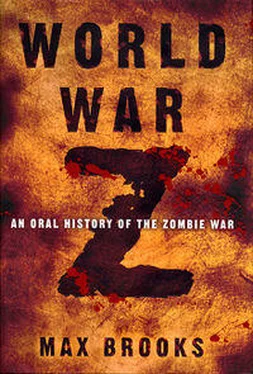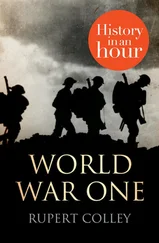We tried to move it, get a chain around the axle and pull it free with one of the tanks. Not a chance. What could we do?
We were an armored platoon, you understand. Tanks, not military police. We never saw any MPs. We were assured they would be there, but we never saw or heard from them, neither did any of the other “units” along any of the other bridges. To even call them “units” is a joke. These were just mobs of men in uniforms, clerks and cooks; anyone who happened to be attached to the military suddenly became in charge of traffic control.
None of us were set up for this, weren’t trained for it, weren’t equipped… Where was the riot gear they promised us, the shields, the armor, where was the water cannon? Our orders were to “process” all evacuees. You understand “process,” to see if any of them had been tainted. But where were the goddamn sniffer dogs? How are you supposed to check for infection without dogs? What are you supposed to do, visually inspect each refugee? Yes! And yet, that is what we were told to do. [Shakes his head.] Did they really think that those terrified, frantic wretches, with death at their backs and safety-perceived safety-only meters away were going to form an orderly line and let us strip them naked to examine every centimeter of skin: Did they think men would just stand by while we examined their wives, their mothers, their little daughters? Can you imagine? And we actually tried to do it. What other alternative was there? They had to be separated if any of us were going to survive. What’s the point of even trying to evacuate people if they’re just going to bring the infection with them?
[Shakes his head, laughs bitterly.] It was a disaster! Some just refused, others tried to run by or even jump into the river. Fights broke out. Many of my men were beaten badly, three were stabbed, one was shot by a frightened grandfather with a rusty old Tokarev. I’m sure he was dead before hitting the water.
I wasn’t there, you understand. I was on the radio trying to call for support! Help is coming, they kept saying, do not break, do not despair, help is coming.
Across the Dnieper, Kiev burned. Black pillars rose from the city center. We were downwind, the stench was terrible, the wood and rubber and stink of burning flesh. We didn’t know how far they were now, maybe a kilometer, maybe less. Up on the hill, the fire had engulfed the monastery. Goddamn tragedy. With its high walls, its strategic location, we could have made a stand. Any first-year cadet could have turned it into an impregnable fortress-stocked the basements, sealed the gates, and mounted snipers in the towers. They could have covered the bridge for… fucking forever!
I thought I heard something, a sound from the other bank… that sound, you know, when they are all together, when they are close, that. . . even over the shouts, the curses, the honking horns, the distant sniper fire, you know that sound.
[He attempts to mimic their moan but collapses into uncontrolled coughs. He holds his handkerchief up to his face. It comes away bloody.]
That sound was what pulled me away from the radio. I looked over at the city. Something caught my eye, something above the rooftops and closing fast.
The jet streaked over us at treetop level. There were four of them, Sukhoi 25 “Rooks,” close, and low enough to identify by sight. What the hell, I thought, are they going to try to cover the bridge’s approach? Maybe bomb the area behind it? It had worked at Rovno, at least for a few minutes. The Rooks circled, as if confirming their targets, then banked low and came straight at us! Devil’s mother, I thought, they are going to bonib the bridge! They’d given up on the evacuation and were going to kill everyone!
“Off the bridge!” I started shouting. “Everyone get off!” Panic shot through the crowd. You could see it like a wave, like a current of electricity. People started screaming, trying to push forward, back, into one another. Dozens were jumping into the water with heavy clothes and shoes that prevented them from swimming.
I was pulling people across, telling them to run. I saw the bombs released, thought maybe I could dive at the last moment, shield myself from the blast. Then the parachutes opened, and I knew. In a split second, I was up and dashing like a frightened rabbit. “Button up!” I screamed. “Button up!” I leapt onto the nearest tank, slammed the hatch down, and ordered the crew to check the seals! The tank was an obsolete T-72. We couldn’t know if the overpressure system still worked, hadn’t tested it in years. All we could do was hope and pray while cringing in our steel coffin. The gunner was sobbing, the driver was frozen, the commander, a junior sergeant just twenty years old, was balled up on the floor, clutching the little cross he had around his neck. I put my hand on the top of his head, assured him we would be fine while keeping my eyes glued to the periscope.
RVX doesn’t start out as a gas, you see. It starts out as rain: tiny, oily droplets that cling to whatever they contact. It enters through the pores, the eyes, the lungs. Depending on the dosage, the effects can be instantaneous. I could see the evacuees’ limbs begin to tremble, arms falling to their sides as the agent worked its way through their central nervous system. They rubbed their eyes, fought to speak, move, breathe. I was glad I couldn’t smell the contents of their undergarments, the sudden discharge of bladder and bowels.
Why would they do it? I couldn’t understand. Didn’t the high command know that chemical weapons had no effect on the undead? Didn’t they learn anything from Zhitomir?
The first corpse to move was a woman, just a second or more before the others, a twitching hand groping across the back of a man who looked like he’d been trying to shield her. He slipped off as she rose on uncertain knees. Her face was mottled and webbed with blackened veins. I think she saw me, or our tank. Her jaw dropped, her arms rose. I could see the others coming to life, every fortieth or fiftieth person, everyone who had been bitten and had previously tried to conceal it.
And then I understood. Yes, they’d learned from Zhitomir, and now they found a better use for their cold war stockpiles. How do you effectively separate the infected from the others? How do you keep evacuees from spreading the infection behind the lines? That’s one way.
They were starting to fully reanimate, regaining their footing, shuffling slowly across the bridge toward us. I called for the gunner. He could barely stutter a response. 1 kicked him in the back, barked the order to sight his targets! It took a few seconds but he settled his crosshairs on the first woman and squeezed the trigger. I held my ears as the Coax belched. The other tanks followed suit.
Twenty minutes later, it was over. I know I should have waited for orders, at least reported our status or the effects of the strike. I could see six more flights of Rooks streaking over, five heading for the other bridges, the last for the city center. 1 ordered our company to withdraw, to head south-west and just keep going. There were a lot of bodies around us, the ones who’d just made it over the bridge before the gas hit. They popped as we ran over them.
Have you been to the Great Patriotic War Museum Complex? It was one of the most impressive buildings in Kiev. The courtyard was filled with machines: tanks, guns, every class and size, from the Revolution to the modern day. Two tanks faced each other at the museum’s entrance. They were decorated with colorful drawings now, and children were allowed to climb and play on them. There was an Iron Cross, a full meter in size, made from the hundreds of real Iron Crosses taken from dead Hitlerites. There was a mural, from floor to ceiling, showing a grand battle. Our soldiers were all connected, in a seething wave of strength and courage that crashed upon the Germans, that drove them from our homeland. So many symbols of our national defense and none more spectacular than the statue of the Rodina Mat (Motherland) . She was the tallest building in the city, a more than sixty-meter masterpiece of pure stainless steel. She was the last thing I saw in Kiev, her shield and sword held high in everlasting triumph, her cold, bright eyes looking down at us as we ran.
Читать дальше












